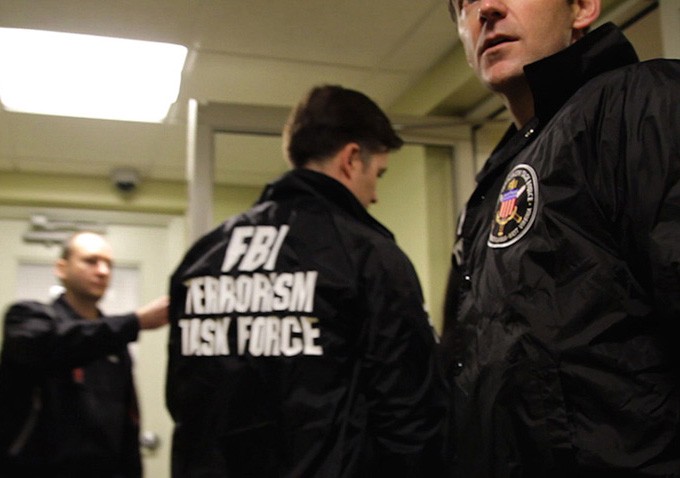Lyric R. Cabral is a photojournalist and documentary filmmaker committed to reporting stories seldom seen in mainstream media. Her documentary work has been supported by artist grants from the BBC, ITVS, Sundance Institute, Tribeca Film Institute, International Documentary Association, Chicken and Egg Pictures, the Smithsonian Institution Photography Initiative and the W. Eugene Smith Memorial Fund. Co-directed with David Felix Sutcliffe, “(T)ERROR” is her first feature-length documentary film and the winner of the 2015 Sundance Film Festival Special Jury Prize for Breakout First Feature and the 2015 Full Frame Documentary Film Festival Grand Jury Prize. (Press materials)
“(T)ERROR” will premiere at the 2015 BFI London Film Festival on October 10.
W&H: Please give us your description of the film playing.
LRC: “(T)ERROR” is the story of Saeed “Shariff” Torres, a 63-year-old former Black Panther-turned-counterterrorism informant for the Federal Bureau of Investigation. The film is the first documentary to place filmmakers on the ground during an active FBI counterterrorism sting operation. “(T)ERROR” interweaves Shariff’s fascinating journey with a penetrating look at the government’s broader counterterrorism campaign, bringing viewers face to face with issues of domestic surveillance, racial profiling, entrapment, freedom of speech and freedom of religious expression. Taut, stark and controversial, “(T)ERROR” illuminates the fragile relationships between individuals and the surveillance state in modern America and asks, “Who is watching the watchers?”
W&H: What drew you to this story?
LRC: After learning that Saeed, my neighbor, friend and confidant of four years, was employed by the Federal Bureau of Investigation as a counterterrorism informant, I felt as though I had an obligation to tell his story. It is rare that one gains access to an FBI informant, especially one who is self-motivated to share his experiences for a wide audience. Saeed’s story offers a rare window into the clandestine world of our government’s counterterrorism tactics and methods and, in service of the public interest, I was attracted to the tremendous potential of his narrative.
W&H: What was the biggest challenge in making the film?
LRC: The biggest challenge to making “(T)ERROR” was navigating the matrix of surveillance that enveloped each of our principal characters. While filming “(T)ERROR,” I assumed that all of my communications with subjects (and others) — digital, telephonic and in person — were actively monitored by government agencies, and I thus adapted new security protocols for reporting, storing and sharing information related to the film. As countering active surveillance is a lifestyle, the production of “(T)ERROR” required altering my patterns of social behavior and communications in a way that had never been demanded of my previous journalism.
W&H: What do you want people to think about when they are leaving the theater?
LRC: I would love for people to consider the possibility that, since 9/11, many foiled terrorist plots in the United States have originated with the FBI and were fostered through the Bureau’s use of an overzealous counterterrorism informant. “(T)ERROR” reveals that FBI informants often induce and cajole individuals who are impoverished, mentally ill or socially disengaged to participate in terrorist plots. Often these paid informants provide persons of interest with the idea and the means to commit a crime.
W&H: What advice do you have for other female directors?
LRC: I would encourage female directors to actively collaborate with other women in film, at all levels of the industry, so as to create working relationships, partnerships and support systems that can combat the misogyny and dearth of opportunities for women in Hollywood and independent film. Moreover, I would say that female directors need to actively cultivate new women directors — I have several young women filmmakers, in high school and college, whom I mentor in support of developing their personal vision and talent, so that they are prepared to enter the industry as viable, competitive directors.
W&H: How did you get your film funded? Share some insights into how you got the film made.
LRC: The film was funded through diverse means, though our largest pieces of funding came from ITVS and BBC, who are co-producers of “(T)ERROR.” Similarly, we received funding though preselling the film in foreign markets and a diversity of grants (Sundance Institute, Tribeca Film Institute, NEA, Chicken and Egg, Firelight Media Next Step Fund, IDA Pare Lorentz grant and Bertha Britdoc Legal Fund) to facilitate production. We also successfully raised $60,000 on Kickstarter, which we are using to release the film theatrically and to promote our audience impact and engagement campaign.
W&H: Name your favorite woman-directed film and why.
LRC: One of my favorite films, which happens to be directed by a woman, is “Mississippi Damned” by Tina Mabry. I love that the film is based on a true story (that of the director’s mother) and lovingly addresses underexplored cycles of poverty and abuse in an African-American family. I especially appreciate the vibrant cinematography of the film, lensed by Bradford Young, which celebrates and consistently shows beauty in contrast to the heavy themes present in the film.







